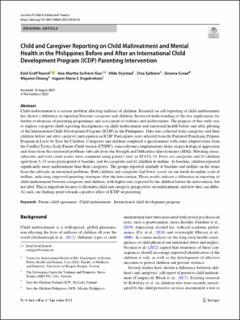| dc.contributor.author | Ramsli, Emil Graff | |
| dc.contributor.author | Skar, Ane-Marthe Solheim | |
| dc.contributor.author | Skylstad, Vilde | |
| dc.contributor.author | Sjöblom, Disa | |
| dc.contributor.author | Gread, Zenona | |
| dc.contributor.author | Chiong, Wayomi | |
| dc.contributor.author | Engebretsen, Ingunn Marie Stadskleiv | |
| dc.date.accessioned | 2022-09-30T11:07:42Z | |
| dc.date.available | 2022-09-30T11:07:42Z | |
| dc.date.created | 2022-09-28T09:50:15Z | |
| dc.date.issued | 2022 | |
| dc.identifier.issn | 1936-1521 | |
| dc.identifier.uri | https://hdl.handle.net/11250/3022859 | |
| dc.description.abstract | Child maltreatment is a serious problem affecting millions of children. Research on self-reporting of child maltreatment has shown a difference in reporting between caregivers and children. Increased understanding of this has implications for further evaluations of parenting programmes and assessment of violence and maltreatment. The purpose of this study was to explore caregiver-child reporting discrepancies on child maltreatment and emotional health before and after piloting of the International Child Development Program (ICDP) in the Philippines. Data was collected from caregivers and their children before and after caregiver participation in ICDP. Participants were selected from the Pantawid Pamilyang Pilipino Program in Leyte by Save the Children. Caregivers and children completed a questionnaire with some adapted items from the Conflict Tactics Scale Parent–Child version (CTSPC), some relevant complementary items on psychological aggression and items from the emotional problems subscale from the Strength and Difficulties Questionnaire (SDQ). Matching items, subscales and total count scores were compared using paired t-tests in STATA 14. Forty-six caregivers and 43 children aged from 5–13 years participated at baseline, and 44 caregivers and 42 children at endline. At baseline, children reported significantly more maltreatment than their caregivers. The groups reported similarly at baseline and endline on the items from the subscale on emotional problems. Both children and caregivers had lower scores on our harsh discipline scale at endline, indicating improved parenting strategies after the intervention. These results indicate a difference in reporting of child maltreatment between caregivers and children, with higher rates reported by the children before the intervention, but not after. This is important because it illustrates child and caregiver perspectives on maltreatment, and how they can differ. As such, our findings point towards a positive effect of ICDP on parenting. | en_US |
| dc.language.iso | eng | en_US |
| dc.publisher | Springer | en_US |
| dc.rights | Navngivelse 4.0 Internasjonal | * |
| dc.rights.uri | http://creativecommons.org/licenses/by/4.0/deed.no | * |
| dc.title | Child and Caregiver Reporting on Child Maltreatment and Mental Health in the Philippines Before and After an International Child Development Program (ICDP) Parenting Intervention | en_US |
| dc.type | Journal article | en_US |
| dc.type | Peer reviewed | en_US |
| dc.description.version | publishedVersion | en_US |
| dc.rights.holder | Copyright 2022 The Author(s) | en_US |
| cristin.ispublished | true | |
| cristin.fulltext | original | |
| cristin.qualitycode | 1 | |
| dc.identifier.doi | 10.1007/s40653-022-00483-0 | |
| dc.identifier.cristin | 2056192 | |
| dc.source.journal | Journal of Child and Adolescent Trauma | en_US |
| dc.identifier.citation | Journal of Child and Adolescent Trauma. 2022. | en_US |

